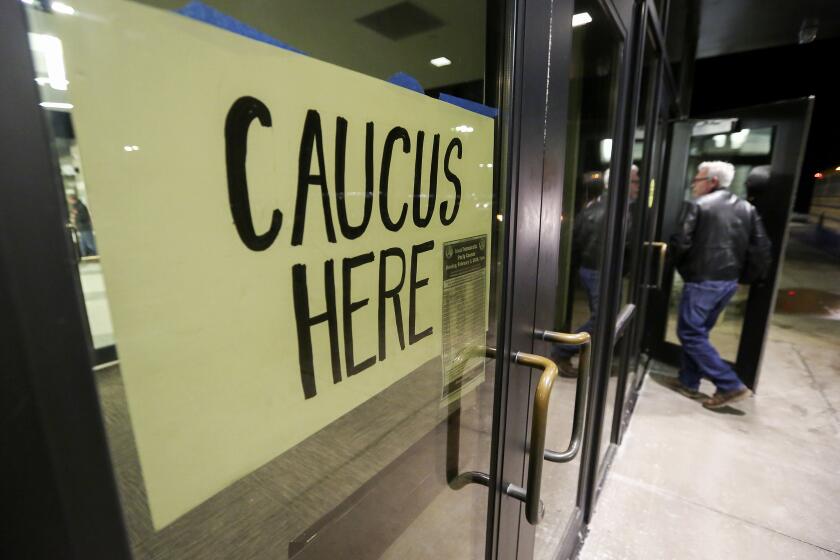‘We feel really terrible,’ says chief executive whose app roiled the Iowa caucus

- Share via
The chief executive of the technology company whose app threw the Iowa caucuses into disarray Monday night defended his company but apologized for a technological glitch that angered candidates, left voters baffled and upended the opening act of the 2020 Democratic presidential primary.
“I’m really disappointed that some of our technology created an issue that made the caucus difficult,” said Gerard Niemira, chief executive of political technology company Shadow Inc., in his first interview after the caucus. “We feel really terrible about that.”
The Iowa Democratic Party contracted with Shadow to build an app to help the party quickly compile results in the state’s 1,765 precincts. But on Monday night, the system quickly broke down.
Niemira, 37, said the problem first became apparent at around 7:45 p.m. Central, when volunteers tried to submit their results and the Iowa Democratic Party’s automated quality control checks discovered “anomalies in transmission reports.” The breakdown, he said, wasn’t with the app itself but in the way Shadow transmitted data to the Iowa Democratic Party.
“The app was sound and good,” Niemira said. “All the data that was produced by calculations performed by the app was correct. It did the job it was supposed to do, which is help precinct chairs in the field do the math correctly. The problem was caused by a bug in the code that transmits results data into the state party’s data warehouse.” That transmission bug, he said, “had catastrophic impact.”
Shadow, a tech developer started by veterans of Hillary Clinton’s 2016 presidential run, built the app being blamed for delaying Iowa Democratic caucus results.
By 9 p.m., problems with the app had delayed the official results, leading to confusion and anger from campaigns, volunteers and reporters. It also raised questions about the integrity of the process and the data it produced. Niemira insists that the app’s data was never compromised. “There’s no evidence whatsoever that there was any kind of hack or intrusion,” he said.
At around 10 p.m., Niemira said the bug in the code was discovered and fixed, after which point the app was able to successfully transmit information into the Iowa Democratic Party’s data warehouse. “The caucus results that came from our app were sound and verified,” he said.
Initially, the Iowa Democratic Party said it was unable to release results from Monday’s caucuses after discovering “inconsistencies” in reporting from some precincts.
On Tuesday afternoon, the party finally released partial results. “We determined with certainty that the underlying data collected via the app was sound,” Troy Price, the state Democratic chairman, said in a statement. “While the app was recording data accurately, it was reporting out only partial data. We have determined that this was due to a coding issue in the reporting system. This issue was identified and fixed.”
The bug wasn’t the only issue with the app, however. Earlier in the day on Monday, Bloomberg News first reported caucus chairs were having trouble signing in. Several complained of insufficient training by the state party.
The difficulty of logging into Shadow’s caucus app stemmed in part from the technological tools meant to safeguard the caucuses from foreign interference, Niemira said. Chairs needed to know a specific precinct ID, use a two-factor authentication system and then enter a personal identification number, he said.
“We’d had people using this app for weeks,” Niemira said. “It had a ‘sandbox’ mode to practice with. What we were seeing early on caucus day was people having difficulty logging in for the first time.”
Complicating the effort to get people used to the app, reports found that caucus officials were asked to download an app called TestFlight that lets people use software that isn’t available publicly. That additional requirement seemed to add another barrier for volunteers.
Niemira said his company updated Iowa Democratic officials with information about how many people were logging into the app throughout the day. Ultimately, most caucus officials did not end up using it to report their votes. Out of all the precincts with access to Shadow’s technology, he said, “we saw about a quarter reporting successfully through the app.”
Volunteers unable to use the app flooded the state party’s telephone hotline to report results, further bogging down the process.
Then, that evening as Shadow relayed results to the Iowa Democratic party, its system for identifying errors set off red flags.
Although the code breakdown was ultimately fixed, Niemira said the problem was avoidable and should have been caught before caucus night: “Yes, it was anticipate-able. Yes, we put in measures to test it. Yes, it still failed. And we own that.”
Shadow’s failures raise questions about the role of technology in vote tabulation. Niemira said that his company hadn’t previously done election-related work and that Shadow had built the app specifically for the Iowa caucus, with another app in the works for the upcoming Nevada caucus.
The Nevada Democratic Party said on Tuesday it no longer planned to use Shadow’s technology.
Niemira sought to draw a distinction between a caucus and a typical election.
“This was not a vote-counting effort. No one was voting on this app,” he said. “We’ve never built any voting tools, and this one was also not a voting tool.” He said an app has a useful role to play in a caucus because precinct chairs are often required to conduct calculations and track multiple rounds of voting.
Shadow, based in Denver, was founded last year and builds technological tools for Democratic candidates and progressive causes. Its major funder is Acronym, a nonprofit group that invests in progressive technology companies, an Acronym spokesman said.
Niemira also confirmed Acronym’s role as majority investor in Shadow but declined to name the company’s other investors. He also declined to name the members of Shadow’s board of directors.
The company’s mission is to help advance Democratic causes and candidates, and its employees were excited to have an important role in Iowa’s historic presidential caucus.
“We exist to help campaigns,” Niemira said. “It really pains me that we did the opposite.”
Green and Newcomer write for Bloomberg.
More to Read
Inside the business of entertainment
The Wide Shot brings you news, analysis and insights on everything from streaming wars to production — and what it all means for the future.
You may occasionally receive promotional content from the Los Angeles Times.











